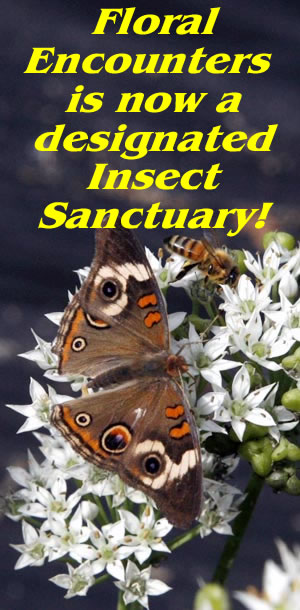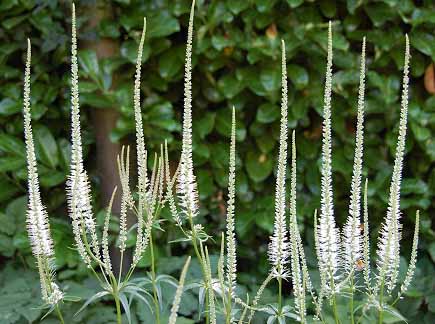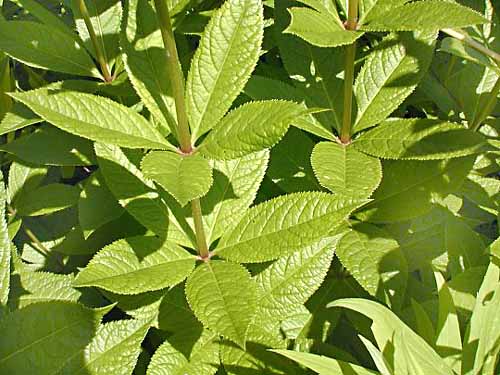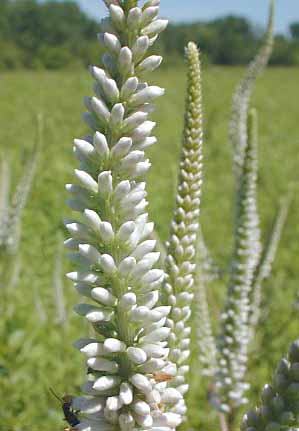A truly lovely native perennial. Growing up to 6 feet in height it makes an excellent back border plant or for meadown like areas. Needs full sun, but once established takes little care, except cutting down the stalks once a year. Lovely white flowers will bloom from early summer sometimes until fall. Easy to establish and does not appear to be eaten by deer or rabbits. Butterflies and bees love it as do many beneficial insects.
Description
A lovely native perennial plant that grows up to 6 feet in height. Dying back
in winter it puts out fairly slender unbranched stems with clusters of 3 to
7 spear shaped leaves that circle the stem in a whorl. Each leaf is up to 8
inches long and 1½ inches wide with sharp, fine teeth, tapering to a
point at both ends. In early summer the branch ends divide and produce a branched
candlearbor-like structure of flower spikes from 3 to eight inches in length.
Individual flowers are tiny, about ¼ inch long, white, pinkish or sometimes
blue and bloom from the bottom of the spike to the top. Plant can flower profusely
and often continues to flower until frost. Will flower from seed in the first
year but takes many years to reach full height. The root system consists of
a central taproot and some rhizomes, which enable vegetative reproduction.
Location and Care.
Hardy to zone 3. Prefers full sunshine but can tolerate some shade. If shade
is too dense staking will be necessary to hold the plant upright. Likes a rich
loamy soil best but most soils are tolerated as long as some organic material
has been dug into them. Will grow best with good organic matter and may not
reach its full height on other soils. Does not like the soil to dry out too
much but cannot tolerate waterlogged soils. Needs watering through the season
as cannot easily tolerate drought. Leaves will turn crispy.
Since plant has tap root it prefers not to be moved. Can take several years
to establish themselves well in a garden and reach full height, but will flower
from seed in the first year. Each year the plant gets bigger and taller. Plants
will increase in size using rhizomes but digging them up and moving them will
cause them to stunt and take several years to re-establish. Mature plants can
be over four feet in diameter. Care should be taken when digging due to taproot.
Often such plants cannot tolerate being moved.
Use a well balanced fertilizer 3-4 times per year especially when plants are
establishing themselves. Water weekly if insufficient rain.
Plant stems can be left until spring to give winter interest to the garden and
provide shelter for beneficial insects.
Growing.
Seeds are very small so although they can be sown directly in the garden their
small size makes it hard to keep weeds away while germination takes place. Sowing
inside where more control is possible is recommended.
If sowing outdoors wait until all danger of frost has passed and broadcast on
the soil surface, as seeds are so small they can fall into cracks between the
soil grains.
Culvert root seeds do best if pretreated with 2 to 3 months of cold stratification.
All our seeds have been cold stratified before sale. Sow in seed trays
or plug tray cells for best results. Keep moist until seeds germinate. See small
seeds under our general growing
instructions.
Germination can be slow and erratic. Some may germinate quickly other may take
up to two months before they germinate. Patience is needed. The small seeds
take quite a while to reach a size large enough to handle. Pot on into larger
pots but do not set outside until they are large enough to establish themselves.
Ensure that seedlings are well hardened before planting outside and water in
well once planted.
Best planted out before rain.
Medicinal Uses
Long used by native Americans as a herbal medicine the roots of this plant are
used as a laxative. It also stimulates the liver and bile with no irritation
to the bowls. It works well as a intestinal and liver tonic. It is useful for
hemorrhoids and many other ailments.
Other names
Beaumont Root, Black Root, Bowman's Root, Brinton Root, Culver's Physic, Culver's
Root, Hini, Leptandra, Oxadoddy, Purple Leptandra, Tall Speedwell, Tall Veronica,
Whorlywort








